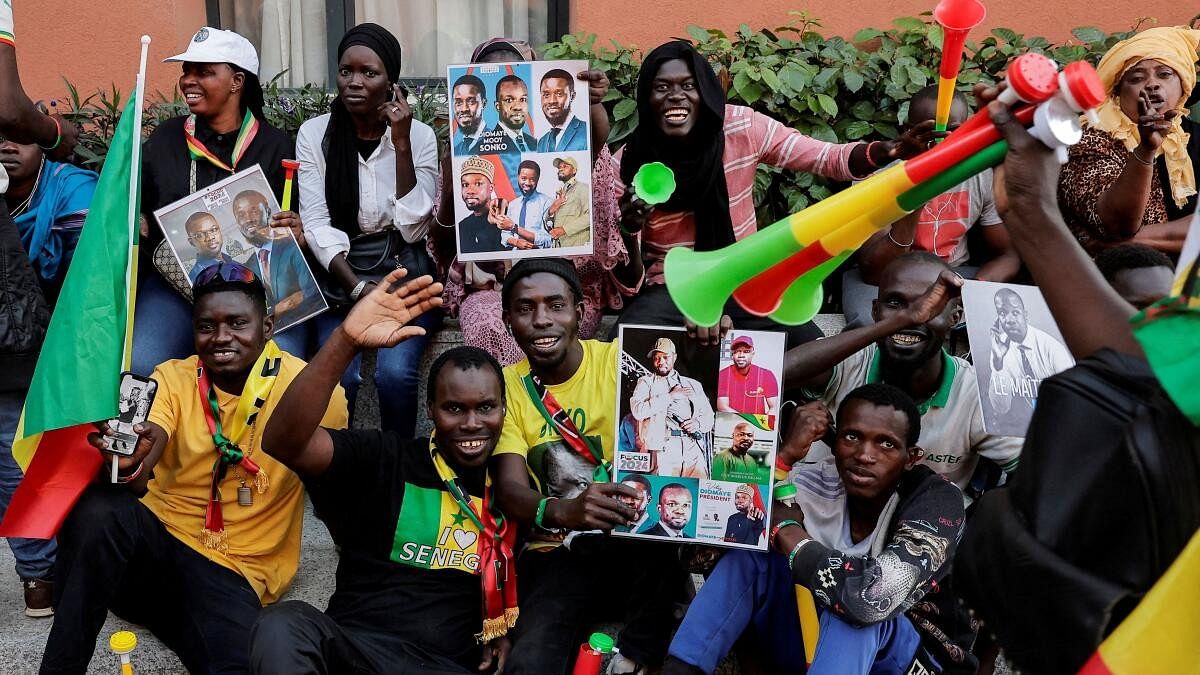
Supporters cheer as Senegalese opposition leader Ousmane Sonko holds a joint press conference with the presidential candidate he is backing in the March 24 election.
Credit: Reuters Photo
Johannesburg: International investors will be closely monitoring the presidential election in Senegal, scheduled for March 24, after delays incited widespread protests.
The country, usually one of coup-prone West Africa's most stable democracies, has been gripped by tension since early February, when President Macky Sall tried to postpone the vote that had been due to take place on Feb. 25 by 10 months, leading to warnings of democratic backsliding.
What are investors focused on?
Senegal has about $4.2 billion of outstanding international bonds, two issued in euros and three in US dollars. For investors in those bonds, the current focus is on whether the presidential vote will be peaceful and fair.
"The market will be looking very clearly to understand whether or not the voters will be able to express their view in what is perceived to be a credible way," said Yvette Babb, a portfolio manager at William Blair Investment Management.
Babb said there was no clear consensus among bond investors as to who would prevail among the 19 presidential candidates, of whom one would have to get more than half of the votes to avoid a second-round run-off vote.
"If you look at the market pricing, it is in my view mainly about the process and not necessarily about the outcome," she said. "The market is most certainly first focused on just getting this behind us."
What about economic politics?
Senegal is generally seen as business friendly and with good economic prospects, thanks to natural gas projects that are set to start production later this year and that the International Monetary Fund (IMF) forecasts will boost GDP growth to double digits by 2025.
It secured $1.9 billion of IMF funding in October, which was seen as a stabilising force for public finances. The pegging of the regional CFA franc currency to the euro is viewed as a positive for keeping inflation relatively contained.
"Ultimately, the biggest risk is of a political nature in Senegal right now," said Joe Delvaux, a portfolio manager at Amundi, Europe's largest asset manager.
"Do I think... economically this will shift much in the country? As long as the political actions are done, I don't think there will be a complete reversal on policies or IMF discussions or cooperation with the IMF," he said.
Could senegal lead by a populist?
All but one of Senegal's 19 presidential election candidates broadly support maintaining the country's business-friendly landscape, said Mucahid Durmaz, senior West Africa analyst at risk intelligence company Verisk Maplecroft.
But the opposition coalition backed by popular firebrand Ousmane Sonko, who has tapped into frustration at a lack of jobs among young people, has pledged to create a new national currency and renegotiate mining and energy contracts.
Sonko and his coalition's presidential candidate Bassirou Diomaye Faye were released from jail on Thursday night, celebrated by thousands of supporters in the streets of the capital Dakar.
While there are no public election polls, Faye is seen as a strong contender to replace Sall, who is stepping down as president after two terms.
"Despite the flow of investment coming in, people are asking why hasn't this changed my life, why haven't I benefited from it?" said Dumaz. "That's a huge popular sentiment in Senegal at the moment and Faye's premises reflect that."